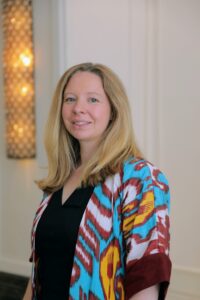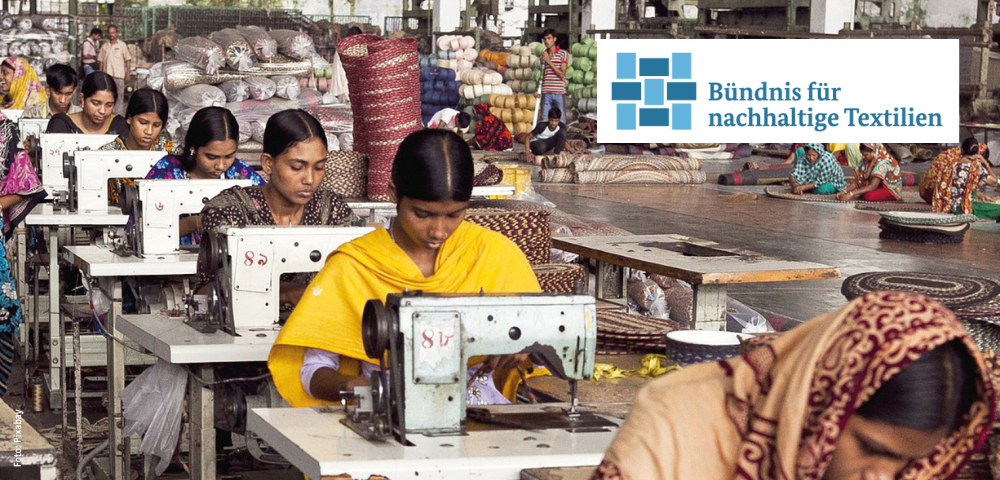– Interview with Gina Burgard, Head of the Partnership Secretariat at Partnership for Sustainable Textiles (Textilbündnis) –
After a decade of commitment to a fair textile industry, the Textile Partnership is facing new challenges. In this interview, Gina Burgard, the new head of the Partnership Secretariat, explains how the Partnership promotes sustainability, increases transparency and expands global cooperation. She provides an insight into current projects and plans for the coming years.
Bremen Cotton Report: What are the Textile Partnership’s tasks and goals today?

Gina Burgard: In the Textile Partnership our goal is to make the textile and clothing industry more social, ecological and transparent – an industry in which the rights of all employees are respected, and the climate and environment are protected.
As a German multi-stakeholder initiative with around 120 members, we bring together various players: companies and associations, non-governmental organisations (NGOs), standards organisations, trade unions and the German federal government. Together, we provide a platform for constructive dialogue, mutual support, joint commitment and shared learning. We cooperate with European and international initiatives in order to disseminate best practices, move forward in a coordinated manner and present joint offers and requirements to members and companies. In this way, we can increase the leverage for engagement beyond the German textile market.
Our work focuses primarily on three main areas: the implementation of due diligence obligations, greater transparency in supply chains and joint involvement in projects that have an impact in production countries. This is how we tackle the major social and environmental challenges facing the industry, with the involvement of those affected on the ground. First and foremost, this means ensuring that employees in the textile industry can lead a decent life with better working conditions, independent representation of their interests and protection from harmful environmental impacts.
What would you like to focus on in your new position?
In thematic terms, the Partnership will continue to focus on the joint commitment of its members and thus on local impact. In addition, support services are to be stepped up to provide members with the best possible assistance in their joint work with the Partnership and in adapting to the regulatory environment. It is important to me to promote the active involvement of our members and to pool their wide-ranging expertise in an even more targeted manner. Another focus is on international partnerships and the use of synergies with other multi-stakeholder initiatives – a current example of this is our cooperation with Fair Wear to open up their complaints mechanism to Partnership members.
How does the Partnership specifically promote sustainability and social justice along the supply chain?
In joint projects, our members work on concrete solutions for more sustainable and fairer textile production. Various stakeholder groups contribute their expertise and experience. The projects aim to achieve a local impact along four focus topics in the Partnership: living wages and purchasing practices, environmental protection, gender equality, and grievance mechanisms and redress.
To name just two examples of the ten initiatives currently underway: In the Partnership’s initiative entitled ‘Implementing Circularity’, companies are working together with other stakeholders to design clothing that is durable, repairable and recyclable – the aim is to create sustainable collections including a digital product passport to enable better sorting and recycling of materials.
The ‘Organic Cotton’ project, on the other hand, aims to support small farmers in India to convert from conventional cotton to organic cotton cultivation. This includes training on humane working conditions, the provision of GMO-free seeds, the payment of premiums, and purchase guarantees from participating companies.
What do you see as the greatest challenges for the Partnership in the coming years?
One of the biggest challenges is to continuously develop our services and adapt them to changes in the legal framework. Our members should be able to find support in the Partnership and develop practical solutions when implementing due diligence obligations that go beyond legislation. At the same time, it is essential to increasingly integrate the voices of local stakeholders in the production countries into our joint products, e.g. through cooperation with local trade unions and NGOs. Their perspectives are vital in terms of improving the situation on the ground and driving forward the transformation to socially and environmentally sustainable supply chains.
Such changes in a complex, global industry need time, commitment and, above all, cooperation – from business, politics, standards organisations, civil society and trade unions. Because together we can achieve more!
At your tenth anniversary event last year, many members of the Partnership signed a declaration of intent. What is that all about?
The signing of the declaration of intent to “strengthen local trade unions and local NGOs as legitimate representatives of rights holders” by Development Minister Svenja Schulze and Partnership members from all stakeholder groups was a highlight of the event. The declaration emphasises the importance of recognising trade unions and NGOs in production countries as representatives of workers and actively integrating their perspectives and voices into our work. Such strong alliances are the key to a fair and sustainable transformation in global supply chains. As a next step, we are now working with the signatories to develop specific measures. We cordially invite other organisations to sign the declaration and support its joint implementation!
Thank you very much for the interview!
 The Bremen Cotton Exchange has been a member of the Partnership for Sustainable Textiles since it was founded in 2014. The Exchange contributes its expertise to the Partnership`s various working groups.
The Bremen Cotton Exchange has been a member of the Partnership for Sustainable Textiles since it was founded in 2014. The Exchange contributes its expertise to the Partnership`s various working groups.
The interviews in the column “Question Time“ embody the opinion of the respective interview partner and do not represent the position of the Bremen Cotton Exchange as neutral, independent institution.

